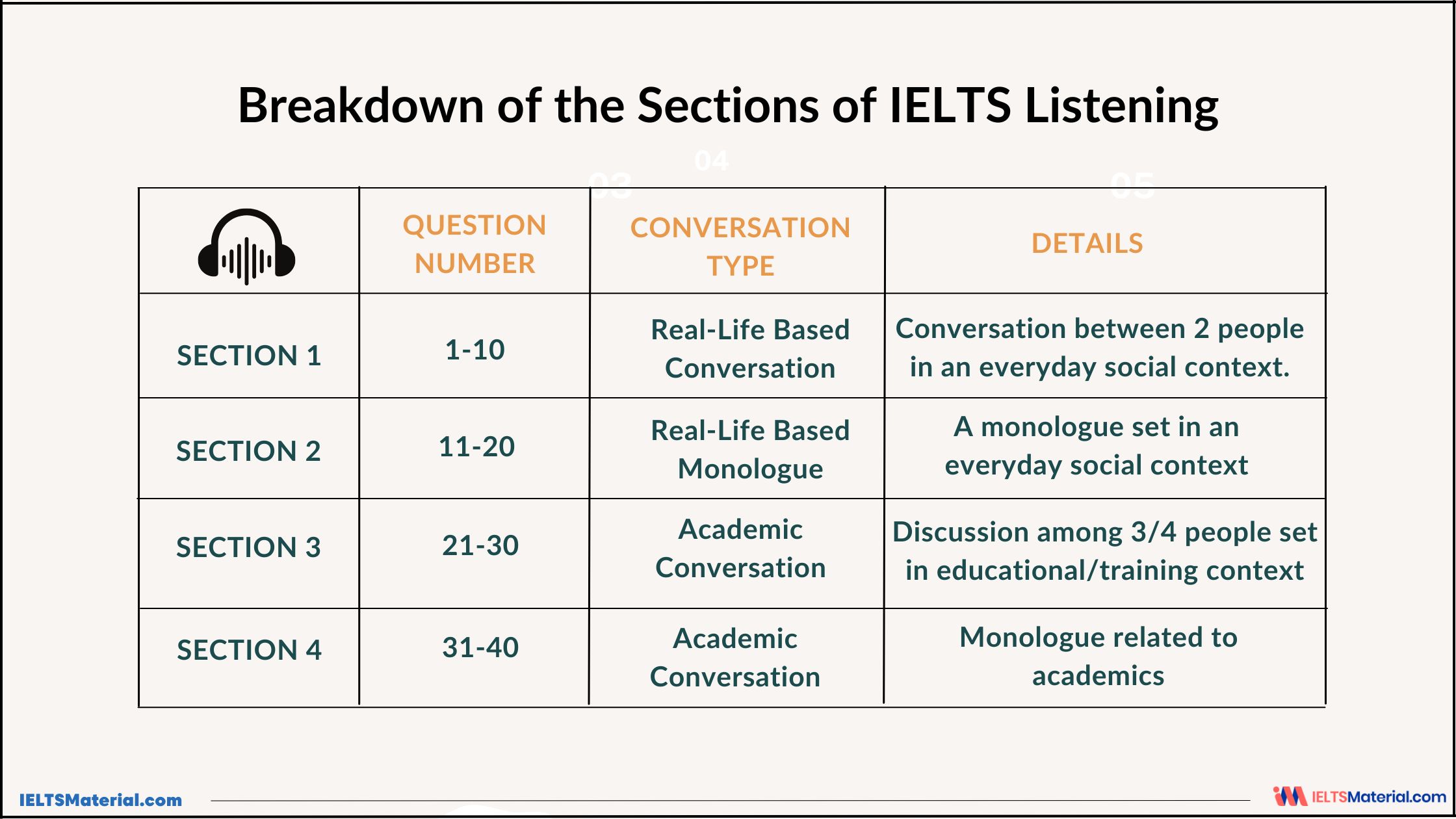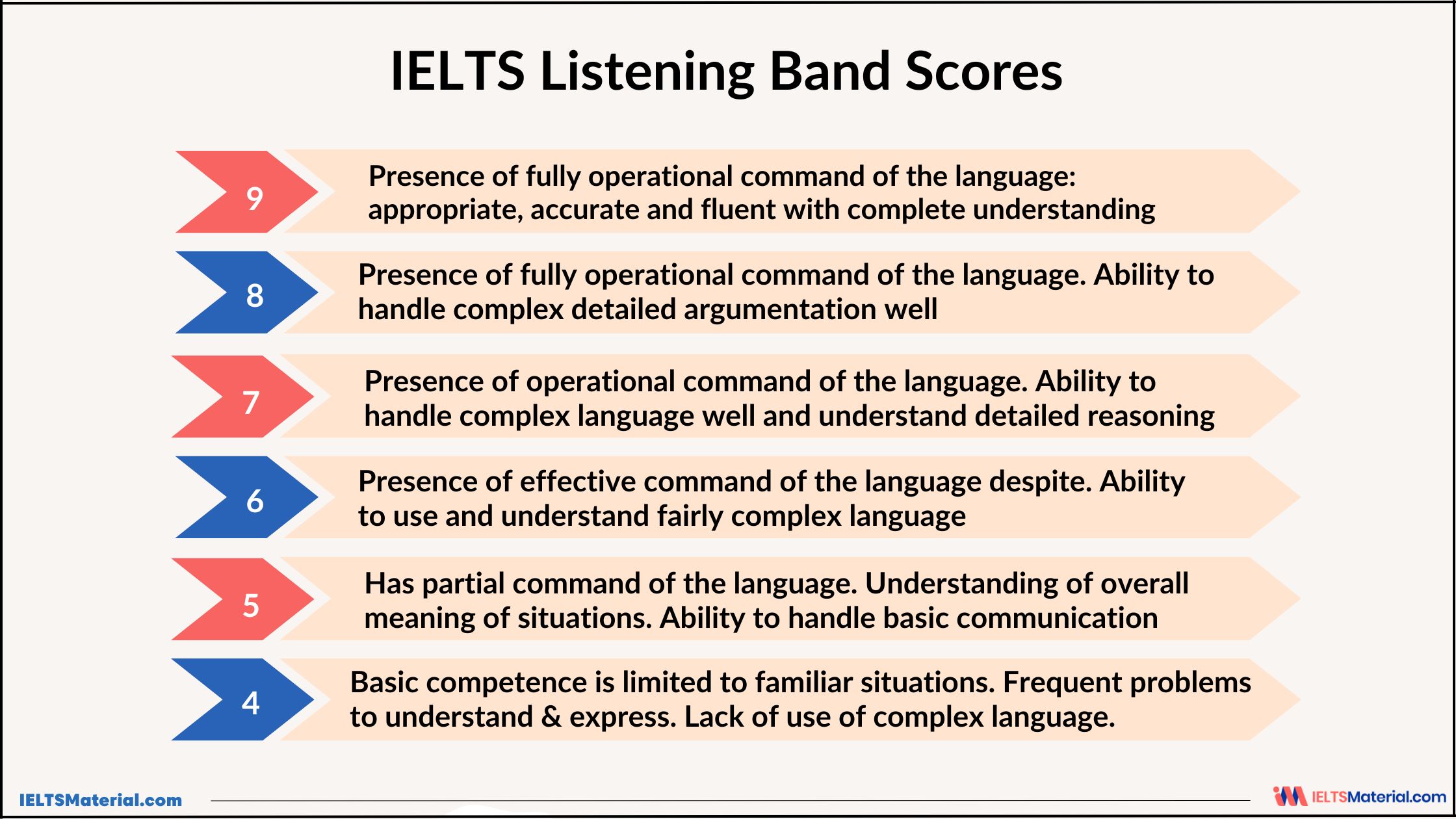IELTS Listening
-
Copy link

Limited-Time Offer : Access a FREE 10-Day IELTS Study Plan!
“Get a clear overview of the IELTS Listening test and unlock helpful tips to boost your score! Master these strategies and put yourself in the best position to achieve your target band score in the IELTS exam, helping you reach your goals with confidence.“
Are you preparing for the IELTS Listening test? Well, mastering IELTS Listening can be tricky, but with the right IELTS Listening tips and strategies, you can significantly improve your performance.
In this guide, we will share essential techniques to tackle various IELTS Listening question types like multiple-choice, table completion, and more. Whether you're aiming for a band score band 7+ or preparing for the IELTS exam for the first time, these IELTS Listening strategies will help you confidently approach each question.
Understanding IELTS Listening Format
The IELTS Listening exam is designed to assess your listening skills through various recordings and questions, assessing how well you can comprehend information, follow conversations, and pick out key ideas and details. Regardless of whether you take the IELTS Academic Listening and IELTS General Listening, the format and scoring are the same.
To master the IELTS Listening exam, it’s essential to familiarize yourself with the exam format outlined in the table below. This will help you approach each section with confidence and clarity!
| Topic | Factors |
|---|---|
| Duration |
|
| Section Division |
|
| Audio |
|
| Question Types |
|
| IELTS Listening score |
|
Breakdown of the Sections of the IELTS Listening Exam
Each section increases in difficulty, so it’s essential to prepare for both conversational and academic-style recordings. Here's what to expect in the four sections of the IELTS Listening exams:

In the table, you will have a detailed IELTS test pattern of the Listening module.
| Section | Details | Purpose |
| Section 1 |
|
This section tests:
|
| Section 2 |
|
This section tests:
|
| Section 3 |
|
This section tests:
|
| Section 4 |
|
This section tests:
|
IELTS Listening Question Types
The IELTS Listening test includes a variety of question types to evaluate how well you understand spoken English. Getting familiar with these question types will help you listen more strategically and boost your Listening IELTS score. Knowing what to expect allows you to concentrate on important aspects and sidestep potential problems.
IELTS Listening Multiple Choice Questions
The IELTS Listening Multiple Choice Questions tests your ability to choose the correct option from three or four choices. Listen closely for keywords or numbers that match the options.
Quick Tips:
- The questions will follow the order of the recording.
- You will be told either to choose ONE option from A, B and C, or TWO options from A, B, C. D and E.
- Always read the questions before you start. This wil give you an idea of what the retort is about and what to listen for.
- Listen carefully to the narrator’s introduction to find out what the recording is about
- As soon as you’ve freshed one question, listen out for the answer to the next (do not dwell on questions you aren’t sure of as you only hear the recording once; quickly move on or risk missing another answer).
Look at some IELTS listening sample for Multiple-Choice questions:
IELTS Listening Table/Note Completion
In IELTS Listening Note Completion, you’ll be asked to complete a table or notes with details from the audio. Pay close attention to specific information like dates, prices, names, and other key facts. These details are crucial, so practice focusing on numbers and important terms while listening.
Quick Tips:
- Always check the word limit in the instructions.
- Use the time before the recording starts to take at the heading and read through the notes.
- Look at each gap individually and guess what kind of word(s) they might be.
- Follow the introduction carefully when the recording starts; the narrator will tell you what the section is about.
- Focus on each question in turn as you listen to the recording. Keep up with the recording as it moves from one question to the next and do not dwell on gaps you have missed. There isn’t time and they will possibly cost you the answer to the next gap as well.
IELTS Listening Sentence Completion
In IELTS Listening Sentence completion, you’ll be given the beginning of a sentence and asked to fill in the missing words based on the audio. It’s important to pay attention to both grammar and meaning to make sure your answers fit correctly. Think about the context and structure of the sentence while you listen, as it will help you choose the right words.
Quick Tips:
- Ensure your answer fits grammatically into the sentence. Therefore, brush up your IELTS Grammar rules.
- Read the incomplete sentence and guess the type of word (noun, verb, etc.) needed.
- Pay attention to keywords in the sentence and listen for synonyms or paraphrased information.
- Follow the given word count strictly.
- Double-check spellings as errors can cost marks.
Look at some IELTS listening sample for sentence completion questions:
IELTS Listening Summary Completion
In IELTS Listening Summary completion questions, you'll listen to a recording and complete a summary by filling in the missing words or phrases. It’s all about catching the main ideas and specific details from the audio. Keep an eye on the context and make sure the words you choose fit naturally into the summary.
Quick Tips:
- Quickly read through the summary to understand its overall context before listening.
- Identify what type of word (number, name, etc.) is likely to fit in each gap.
- Expect the audio to use synonyms or rephrase the text in the summary.
- Use the surrounding text to help decide what fits logically.
- Ensure the completed summary reads fluently and makes sense.
Look at some IELTS listening sample for summary completion :
IELTS Listening Labeling a Diagram/Map/Plan
In IELTS Listening Map Labeling, you’ll be asked to label a visual display, such as a map or a diagram, based on the information you hear. As you listen, try to visualize the layout in your mind and connect the audio details to the correct spots on the map. This task tests your ability to follow directions and spatial descriptions.
Quick Tips:
- Read the instructions so you know what to write (e.g. a word or letter).
- Look at the map and try to understand what it shows and how each location might be described.
- Use the places already marked on the map to help you follow the recording.
- You will have to transfer the information you hear to a simple picture or plan of some kind.
- You will need to be familiar with the kind of language used to express where things are.
Practice some IELTS listening sample for Labeling questions:
IELTS Listening Matching Questions
In IELTS Listening Matching Questions, you’ll be given a set of options and asked to match them to a list of main points or people. The key is to listen carefully and identify parallel ideas or relationships in the audio. Pay attention to the details, as the answers often rely on subtle connections between the options and the conversation.
Quick Tips:
- Matching requires you to listen to detailed information and connect it to a number of places, people, groups etc.
- You will only hear the part of the recording related to the matching task ONCE.
- Match ONE piece of information from the box to each question.
IELTS Listening Short Answer Questions
In IELTS Listening Short Answer Questions, you'll need to write a word, a few words, or a number based on what you hear in the audio. This task requires careful listening to capture the exact details, so focus on key information like dates, names, or specific facts. Keep an eye on the word limit as well!
Quick Tips:
Each of these tests a different skill, from identifying key details to linking ideas. The listening tests will be of the same type for both academic as well as general training categories. Expect a mix of question types in each part.
Access free practice materials for a better IELTS listening band score. Download now!
IELTS Listening Band Score
The IELTS listening band score starts from 1 (non-user) to 9 (expert user). You will get 1 mark for each correct answer, so the total marks equal the number of questions (40). The total marks are converted to a band score using the official IELTS 9-band scale. Remember that IELTS academic listening scoring is the same as IELTS General Listening score process.

To know more about IELTS Listening scoring, check out the table that illustrates IELTS band score.
| Correct Answers | Band Score |
|---|---|
| 40-39 | 9 |
| 38-37 | 8.5 |
| 36-35 | 8 |
| 34-32 | 7.5 |
| 31-30 | 7 |
| 29-26 | 6.5 |
| 25-23 | 6 |
| 22-18 | 5.5 |
| 17-16 | 5 |
| 15-13 | 4.5 |
| 12-11 | 4 |
Be a part of IELTS webinars and learn how to use the IELTS preparation material given below efficiently
IELTS Listening Material for Better Preparation
With different kinds of IELTS study material available on the internet, it is difficult to choose the best ones. So, here is a list of videos, free IELTS Listening practice tests and relevant links for ielts preparation material to help you save time and focus on your preparation.
IELTS Listening YouTube Videos
- IELTS Listening Table Completion Tips
- IELTS Listening Note Completion Tips
- IELTS Listening 2024 Flow Chart Completion
- IELTS Listening Summary Completion Task
- IELTS Listening Answer Short Question
IELTS Listening Practice Tests
- IELTS Listening Practice Test 2025 with Answers
- IELTS Listening Practice Test 2025 with Answers | FULL IELTS Listening Test
- IELTS Listening Practice Test 2025 with Answers | 05.01.2025
- IELTS Listening Practice Test 2025 with Answers | February
- IELTS Listening Practice Test OCTOBER 2024 with Answers
- IELTS Listening Practice Test 2024 with Answers | 18.02.2024
- IELTS Listening Practice Test 2024 with Answers | 02.03.2024
IELTS Listening Study Materials
- How to improve listening sections 3 and 4?
- Useful Resources & Websites For IELTS Listening
- Improve Your Skills: Listening & Speaking For IELTS 6.0 – 7.5 (Ebook)
- 1200 Commonly Repeated Words In the IELTS Listening Test
- IELTS Listening Recent Actual Tests Volume 3 (Ebook & Audio)
- IELTS Listening Recent Actual Tests Volume 4 (Ebook & Audio)
- 15 Days’ Practice For IELTS Listening (Ebook & Audio)
- Should You Use All Capital Letters In The IELTS Listening And Reading Tests
Top Tips for Success in IELTS Listening
To get a high overall band for IELTS Listening, you need to excel in the listening test. And for that, implementing the following tips to maximize your IELTS Listening preparation is crucial. So, let’s have a look at some of the top IELTS Listening tips:
- Expand your vocabulary - Make flashcards for common vocabulary topics like education, work, travel, health, hobbies, and technology. Listen to vocabulary-building audio lessons.
- Get familiar with accents - Train your ear by watching TV shows, movies, and news clips with different English accents like British, Australian, and American. Focus on comprehending fast, natural speech.
- Listen for key details - Practice picking out important numbers, stats, dates, names, and facts when listening. Note these down rather than trying to understand everything.
- Take organized notes - Develop your own shorthand style of note-taking. Use abbreviations, symbols, and formatting to capture info quickly.
- Analyze questions - Read questions carefully before listening and predict the type of answer needed to be based on keywords like "when", "how many", and "why".
- Improve concentration - If you lose focus, take a deep breath and zero in on the next question. Don't let one lapse affect your whole test.
- Listen for paraphrases - Answers won't be exact words from the audio, so listen for synonyms and rephrased options.
- Learn question strategies - Study techniques for multiple choice, fill in the blanks, matching, and other question types.
- Review answers - Double-check at the end for silly mistakes. Make sure answers are clear and properly spelled.
- Develop speed - Practicing IELTS Listening actual tests against the clock to improve your listening pace and efficiency.
Common Mistakes to Avoid in IELTS Listening
Given below are 5 common mistakes that candidates usually make in the IELTS Listening module. So, take note of them and practice enough to avoid them.
- Missing Instructions: Carefully read and follow the instructions for each question type to avoid unnecessary mistakes.
- Overlooking Plural Forms: Pay attention to singular and plural forms, as they can change the meaning of an answer.
- Writing Answers in the Wrong Format: Ensure you write answers in the correct format, such as dates and times.
- Ignoring Synonyms: Be aware of synonyms and paraphrasing, which are commonly used in the test.
- Not Reviewing Answers: Use any remaining time to review your answers and correct any obvious mistakes.
IELTS Listening requires consistent practice, strategic preparation, and a thorough understanding of the test format. By following these tips and techniques, you can enhance your listening skills and achieve a high band score. In case you need any sort of guidance, feel free to interact with our IELTS experts. Stay focused, practice regularly, and approach the test with confidence.
Recent Articles

Nehasri Ravishenbagam

Kasturika Samanta

Kasturika Samanta



